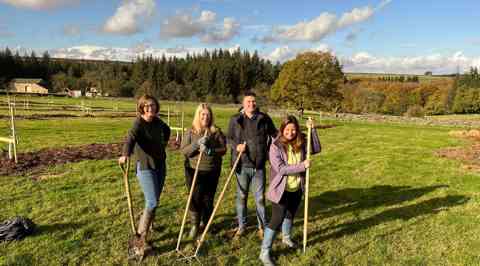As we come to the end of Stress Awareness month, and what a month it has been! We have been relooking at our blogs that might help motivate people, provide a little extra support in these tough times and celebrate one of our favourite things – food!
The following transcript is from an interview between Lime Venue Portfolio and Andrew Walker, one of the Executive Chefs at Compass Group. Andrew has long been an advocate on the positive benefits food and nutrition can have on mental health.
Lime Venue Portfolio enjoys working with Andrew, he remains one of the most dynamic and creative Chefs working within the meetings and events industry. Here we hear about both his approach to, and his passion for, the subject.
What’s your approach to brain food?
For a long time now, health and eating have of course been intrinsically linked. Undoubtedly certain foods create certain moods, and as an industry we are already seeing menu items appear that support this. They can include ingredients such as kombucha and kimchi, and technique-based trends towards fermentation and probiotics.
But as we move forward, and as mental health rises higher up the social agenda, people are certainly starting to think about not just their hearts, not just about salt and saturated fats, but about the absolutely positive impact eating the right kind of foods can make on your personal mental wellbeing. Menus can be designed to be good for our bodies and our brains, and there is increasing levels of research to support this. The Feeding Minds Mental Health Foundation Report states that, ‘the body of evidence linking diet with mental health is growing at a rapid pace.’
We already know that food has a larger impact than the initial sensory experience, it can play a role in productivity, mood, concentration – all things we need to consider in the events world when we feed large numbers of people.
For me, good food is simply good karma. Knowing that what you’re eating has come from a good place and that simply by eating it, you’re actually doing something positive. Having great messages and information about the food we eat gives people a sense of understanding and control about what they’re putting in their bodies. People want to know what’s going on inside them! And that’s what adds to great karma.
We can also help delegates feel good about themselves if they know that we care about food wastage and provenance as much as they do. Whether cooking at home or for a large-scale event, the green credentials and principles behind it have to be real. Peoples thoughts in relation to all things green are macro and micro. Micro that they grow their own herbs or have a tub of parsley on the windowsill, macro that they know where our parsley is sourced.
Good food needs to equal good mood.
How can we democratise the food experience?
Nowadays, the event experience is not to be defined by your dietary requirements. ‘Food for all’ should be at the root of all great events - mushroom stroganoff and ratatouille need to be banished to the bygone days of bigoted cuisine.
Moreover, there is a practical reason for cooking with a high level of culinary care, as food allergens are on the increase and legislation demands evermore prescriptive knowledge. Creating dishes that are inclusive - whilst sometimes challenging, but always interesting – not only enriches the dining experience but makes it easier for the people who are cooking. No chef wants to face 90 specialist diets on a banquet of 450.
What suggestions can be made by the chef to create a more inclusive dining experience?
Chefs need to understand the fast pace of change. It’s not only about looking to the past for culinary inspiration, but truly understanding insight and trends. There needs to be a real thirst for knowledge, which undoubtedly has to be coupled with a massive cultural change for the better.
This is about transforming insight into reality, making sure that there is a link between information gatherers and the people that have to deliver amazing experiences at the sharp end of an event. It’s about having interesting, flexible, conversations with event organisers. As chefs, we can change our approach. We can create a plant-based menu – a planquet - that everyone can enjoy or a succulent hog roast.
We also have to consider all the practical elements for events. Ensuring non-alcoholic drinks are as tempting and delicious as the alcoholic ones being served. They ought to be as well thought out as the rest of the aperitifs and cocktails, garnished beautifully with depths of flavour and intricacy, sipped and enjoyed over ice in the same was as a gin and tonic. Seedlip is a brand that is hitting the spot providing highly flavoured, non-alcoholic sipping drinks. They have the same treat, the same indulgence as an alcoholic drink, without the alcohol.

The food experience – where does it start?
The reality of experiential dining is knowing how to create feelings in the moment, understanding the difference between a padded table that curiously creates a feeling of comfort and calmness, and the harsh feeling of wood underneath your elbows.
It’s about tables not being overly cluttered, the right room temperature, music (not muzack), the right levels of lighting, and a friendly approach to service, communication without pomposity and formality, but maintaining a real sense of professionalism. All these important details provide the perfect backdrop for a mindful food experience.
What are the ways in which the menu can help delegates feel good post-event?
People understand the difference in the kinds of foods they eat at home and in the workplace and are now making choices based in ethics rather than just based on whether something is healthy or not. Knowing their food is sourced locally, ethically, that waste is minimised – it may be that people can enjoy their meal and relish their experience more with this knowledge. We have used Menu Maps in the past, which show where your food has come from to create your menu.
By offering information about suppliers, the event can be used as a platform to create links with suppliers who have provided food that night, we call it a ‘menu in-depth’. It provides real support and recognition for the community by showcasing their product and creating a full circle experience and a reality around what we’re doing.
Mental health for the event organiser; don’t forget about yourself!
The job of both a chef and an eventprof are stressful. They have a lot in common due to their workloads, work schedules and high-pressure environments. This can lead to all day grazing, snacking at night, eating the wrong thing, too much caffeine – unhealthy habits. Food should be a priority in our own working day as well as a priority at our events.
On the event side, it is helpful in my experience for both parties to have trust in one another’s abilities. The event organiser can worry about one less thing if they are able to put their full trust and confidence into their chef or caterer. Knowing that they have the ability to achieve what you have asked for. Having this assurance means the food aspect of the event isn’t a worry for the organiser.
Similarly, we need to look after our own. If we want people to deliver great service and deliver great food, we need them to feel great about themselves. This starts with looking after their own nutrition - fried chicken in the early hours of the morning is a chef’s guilty secret that needs to stop.
How much significance can the food have at an event in regard to mental health?
The food choices and the menu can stand for something and can reinforce a message, they can help illustrate a story or make a point. But they can also be a detriment to the event if they are not considered properly.
By curating menus that are designed to provide slow-release energy for delegates who have a long day of meetings means we understand that nourishing them properly is a duty of care. We want them to get the best out of their events and we know there are links between diet and concentration levels. Lime Venue Portfolio have venues which have achieved ‘Food for the Brain’ accreditation which focuses on exactly that link - the importance of nutrition in mental health.
What are your own recommendations for eating with consideration for mental health?
Food is historically a social event. If you link happiness with food, the sitting down, the talking, the sharing, the laughing; that can only lead to wellbeing of a certain kind. Christmas dinner isn’t defined by turkey or bread sauce, it’s defined by the people, the friends and family and loved ones who are sat around the table. Having good food at events facilitates this positive interaction and social inclusion.
We also need to listen to our own needs and stop sugar shaming. Sometimes satisfying that chocolate craving with a triple chocolate milkshake served with a doughnut and a straw is going to hit the spot, and sometimes not. A little bit of something naughty not too often isn’t such a bad thing.





